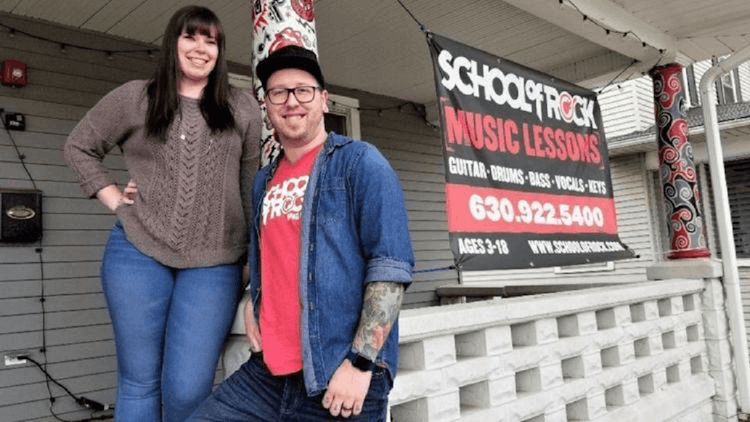By David SharosNaperville Sun
Description of business: “Students are not only being taught an instrument, they’re learning to deal with life situations, building confidence and becoming better people. At School of Rock Naperville, learning music in a lesson room is just the beginning. We get kids playing on stage as quickly as possible, teaching them to play as soloists and as part of a team. This immersive method motivates them to be their best, helping them learn skills faster and more thoroughly,” Sean Walker says.
What was the reason for this more holistic development of kids and the approach you use? “We really feel the best way to learn music is to share and tying everything together gives them a direct application. I compare it to math – when I started balancing my own checkbook, math started making a whole lot more sense for me. This way, we turn it into a social experience which helps with the practicing and also they get to directly apply these theoretical techniques and concepts they are working on privately.”
What do parents say about molding their children into something else since you have this behavioral slant and yet your resumes don’t include behavioral psychology or being academic teachers? “We hear a lot from parents about the social element and the fact we’re putting students in groups with each other and it takes things one step further. We have these students who come in and are shy and very introverted and give them a couple months and parents are astounded how they are coming out of their shells and doing in public what they only did at home. We’re creating a place to nurture that behavior.”
Years ago, everyone wanted to be a guitar hero or a drummer or a keyboardist. Has that changed or does everyone still gravitate toward those instruments? “When I was growing up, everyone wanted to be the guitar player or the singer, but we’ve seen an influx with drummers with this generation more than anything else. I definitely feel there is a desire to play the traditional instruments.”
What do you do when someone comes in and wants to play something you don’t? You can’t possibly play all the instruments.”Between Lauren and me, as well as the staff, we pretty much cover all the basic instruments we teach. Our staff is always very in tune with that and if someone is talking to me and maybe I’m not a strong keyboard player, we’d set them up with a trial lesson with an instructor who can give them the best experience possible.”
“One of the most important things you can do with a youngster is to have an instructor the child can bond with,” Lauren Bolt adds. “We do everything to make sure the pairing is right.”
What are some of the strangest instruments you’ve been asked to teach? Very few people want to play the xylophone, for example. “I’ve heard harmonica and I’ve taught banjo lessons before,” Sean Walker says.
“Someone one asked me for sitar lessons, and I don’t think any of us know how to play that, but it’s a beautiful instrument,” Bolt adds.
How much do musical genres affect the whole lessons thing? With rap and country being more popular than, say, 20 years ago, what is that doing to affect the business? “For us, our big goal is to teach students where these influences came from and how the modern music was guided by them, so if we see kids really interested in Taylor Swift, we’ll try to take them back and show them some of the artists that came before and inspired them and still teach them the whole technique and how to apply that.”
How would you describe your business philosophy? “The philosophy is:’“Don’t let the mission get lost in the day-to-day administrative tasks and challenges.’ We exist because of our students and what the joy of learning and sharing can do for people intellectually and emotionally. As long as we operate keeping that in mind as the end goal, we’ll do a better job and have more fun.”
What is the best thing as well as the biggest challenge about owning your own business? “The best thing is being able to create the culture that you want to work in and be able to live according to the principles you feel are important. The biggest challenge of owning your own business is the ultimate responsibility. You have to keep the faith and that’s not always easy when you’re working a ton of hours.”
Here’s the $64,000 question: What’s the easiest instrument to learn? “We do get asked that all the time. It depends on where you want your child to be – each instrument has its own learning curve and it takes place at different areas. A bass is very easy to get started on, but hard to get good at it. You hit the learning curve a little bit later with chord theory and how it fits in. Drums are a coordination battle.”



